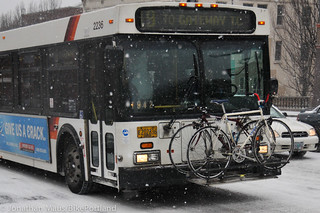
20 bus lines to frequent service.
(Photo: J.Maus/BikePortland)
A coalition of transportation and environmental groups is opposing a payroll tax that would create a massive boost to TriMet bus service.
As reported Wednesday by The Oregonian, they’re doing so because the tax would fall flatly on both rich and poor workers, like TriMet’s existing payroll tax does.
The main differences: unlike TriMet’s employer-side payroll tax of 0.7337 percent, which is invisible to employees, this tax of 0.185 percent would appear on paychecks alongside Social Security and Medicare; and the revenue could be spent only on bus service, unlike other payroll taxes that have been earmarked for new rail service, bus service or construction projects.
To someone earning $20,000 a year, the proposal would cost about 71 cents per week, or $37 per year. For someone earning $60,000, it’d be about $2.13 per week, or $110 per year.
Economically, employer-side and employee-side payroll taxes are very similar, because employers factor them into the cost of paying workers. But the proposed employee-side tax would apply to some groups, like seasonal agricultural workers or employees of public schools or 501(c)3 organizations, whose employers are currently exempt from TriMet tax.
To someone earning $20,000 a year, the proposal would cost about 71 cents per week, or $37 per year. For someone earning $60,000, it’d be about $2.13 per week, or $110 per year.
If fully enacted by TriMet’s board, that’d be enough to boost TriMet’s effective payroll taxes by 25 percent, or about $70 million this year. All of that would go to “improving or maintaining” bus service.
If we assume that this includes both bus operators and its bus maintenance workers, it’d come out to an overnight boost of $70 million a year for TriMet’s bus funding, a 42 percent increase. That’d be approximately enough to create five new frequent-service bus lines from scratch, or to upgrade 10 standard-service bus lines to frequent service.
It’s about six times larger than TriMet’s most recent round of cuts and fare hikes, in 2012.
Advertisement
In an interview Wednesday, Bicycle Transportation Executive Director Rob Sadowsky said the BTA based its opposition to the bill on input from its partners in the Transportation Justice Alliance, a group that includes the BTA, Community Cycling Center, OPAL Environmental Justice Oregon, Oregon Walks, the Asian-Pacific-American Network of Oregon, Portland Community Reinvestment Initiatives and the Native American Youth and Family Center.
“We’re hearing really loud and clear from partners that we partner with in the transportation justice coalition that it is really hard to support an increase in employees’ income tax if it is not progressive,” Sadowsky said. “The reality is that people of moderate to low income are facing a lot of challenges, and it starts with affordable housing.”
“An income tax is more just than a wage tax because the income of poor and working class households comes almost exclusively from wages.”
— Vivian Satterfield, OPAL Environmental Justice Oregon
In a letter to the state legislature, the BTA joined with 1000 Friends of Oregon, Better Eugene-Springfield Transit, the Oregon Environmental Council and the Oregon League of Conservation Voters to note that transit agencies don’t need legislative permission to levy a new net income tax, which would cover more types of income but exempt people with zero taxable income.
The two largest transit agencies in Oregon – TriMet and Lane Transit District (LTD) – already have the statutory authority to implement a residential “net income tax” to fund transit in their service area, ORS 267.370. This authority allows transit agencies to collect taxes on all forms of taxable income – such as interest, dividends, rental payments, capital gains, and other forms of income that are not derived from wages paid by an employer. This existing tax authority also has the additional benefit of being easily implemented and administered, as it may be collected as surtax on state income taxes.
The TJA haven’t taken a formal position on the bill, S.B. 1521, which has been pushed by Senate President Peter Courtney. But another of its members, OPAL, sent a similar letter of its own.
“Advocates for poor and working class families such as ourselves recognize that an income tax is more just than a wage tax because the income of poor and working class households comes almost exclusively from wages, while a larger share of income comes from non-wage sources in more affluent households,” Deputy Director Vivian Satterfield wrote.
Sadowsky said his group would support a further payroll tax hike “if it was progressive” and added that “TriMet shouldn’t be going out on their own” to get new revenue, but instead working with other partners for a bigger package next year.
“If you do one thing, it’s going to be difficult to really build a great 2017 transportation package,” he added. “Someone says We don’t need to fund you because you just … blank blank blank. … We need to set up a comprehensive and holistic way of funding transportation and not picking up little things.”
Correction 2/12: An earlier version of this post inaccurately estimated the approximate number of frequent service bus lines that could be created with the new money.
— Michael Andersen, (503) 333-7824 – michael@bikeportland.org
BikePortland can’t survive without paid subscribers. Please sign up today.


